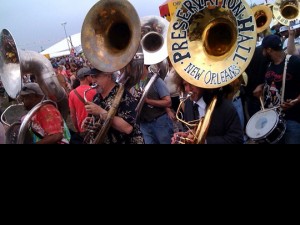jaffe-540.jpg

“Once it starts, it’s like an avalanche. The best thing you can do is pace yourself”. When it comes to The New Orleans Jazz & Heritage Festival, those words should be heeded, since they were spoken by a musician who first played Jazz Fest in grade school. Ben Jaffe of the Preservation Hall Jazz Band spent his childhood surrounded by traditional jazz at Preservation Hall, which his parents began operating in 1961, but Jazz Fest is where Jaffe soaked in the full range of the sounds of New Orleans, and got a condensed-yet-comprehensive musical education.
The early years of the festival coincide with Jaffe’s infancy, so it could be said both the Festival and Jaffe grew up alongside one another. The New Orleans Jazz & Heritage festival was first held in 1970 (Jaffe was born in 1972) and drew a crowd of 350 people. By the end of the 1980’s the festival was drawing 300,000, and last year's attendance reached 425,000. Jaffe has seen the festival evolve, and long-time attendees have watched Jaffe grow as well. We sat down with Jaffe to get his thoughts on the magnitude of Jazz Fest, and find out what it means to him personally. “Jazz Fest is a lot like Preservation Hall to me. I don’t have a first memory because it was just part of our upbringing,” said Jaffee. “I have seen pictures of me there as an infant, but I can’t remember my first time going. What I do remember is when I first played the festival with the McDonogh 15 school band under the direction of Walter Payton. I was 8 or 9.”
 Playing on stage in front of hundreds of thousands of people at 8 years old is a priceless piece of musical experience, and so is absorbing the music of some of New Orleans' (and the worlds') greatest musicians. “Jazz Fest is the first place I heard Jesse Hill and Oliver Morgan. As well as Ernie K-Doe, Allen Toussaint, the Meters, the Neville Brothers, Dr. John, David Bartholomew, Deacon John and many others. As a kid growing up, I didn’t get to hear these people anywhere else. I mean, we couldn’t go hang at The Dew Drop,” said Jaffe. “You could take the Jazz Fest lineup for its first 20 years, and that’s my music education right there.”
Playing on stage in front of hundreds of thousands of people at 8 years old is a priceless piece of musical experience, and so is absorbing the music of some of New Orleans' (and the worlds') greatest musicians. “Jazz Fest is the first place I heard Jesse Hill and Oliver Morgan. As well as Ernie K-Doe, Allen Toussaint, the Meters, the Neville Brothers, Dr. John, David Bartholomew, Deacon John and many others. As a kid growing up, I didn’t get to hear these people anywhere else. I mean, we couldn’t go hang at The Dew Drop,” said Jaffe. “You could take the Jazz Fest lineup for its first 20 years, and that’s my music education right there.”
As the festival and Jaffe grew alongside each other, both spread New Orleans music into the hearts of the masses. Although the festival has grown to more than 1,000 times its original size and features headliners such as Phish, Eric Clapton, Santana and The String Cheese Incident, Jazz fest is still all about New Orleans. Jaffe says “I’ve seen it evolve. The Jazz Fest I grew up with was much different than the one my parents first helped organize in Congo Square. As Jazz Fest has grown and evolved to celebrate a very broad spectrum of music, it has retained these very unique qualities that are very particular to New Orleans. The Gospel Tent, the Modern Jazz Tent, the Blues Tent and Economy Hall ... a lot of those acts are New Orleans acts. I think it’s amazing they're able to do that. Then you have the brass bands and the Mardi Gras Indians; all those things harken back to the very first Jazz Fest.”
 Not only has Jazz fest stayed true to its founding principles and spread the sounds and soul of New Orleans throughout the world, it’s also an integral thread in the fabric of the New Orleans music community. “When you think about how New Orleans-based music has evolved in the last 40 years, Jazz fest has always represented those changes”, explained Jaffe. “Jazz Fest embraced bands like Dirty Dozen and Rebirth. Jazz Fest has become a part of New Orleans just as Mardi Gras is. Especially for musicians. It provides an incredible amount of opportunity for musicians to perform, whether at Jazz Fest or at events that week. It’s created a micro economy in our community. There are a lot of business that pop up during Jazz Fest, and lots of second line crews and Mardi Gras Indians get to perform as well. The folks who put the festival on work hard to involve and represent all these groups. There was a mission that was ingrained in the founders of Jazz Fest, and that mission still remains. The festival was created to be a representation of the community, and it represents the community well.”
Not only has Jazz fest stayed true to its founding principles and spread the sounds and soul of New Orleans throughout the world, it’s also an integral thread in the fabric of the New Orleans music community. “When you think about how New Orleans-based music has evolved in the last 40 years, Jazz fest has always represented those changes”, explained Jaffe. “Jazz Fest embraced bands like Dirty Dozen and Rebirth. Jazz Fest has become a part of New Orleans just as Mardi Gras is. Especially for musicians. It provides an incredible amount of opportunity for musicians to perform, whether at Jazz Fest or at events that week. It’s created a micro economy in our community. There are a lot of business that pop up during Jazz Fest, and lots of second line crews and Mardi Gras Indians get to perform as well. The folks who put the festival on work hard to involve and represent all these groups. There was a mission that was ingrained in the founders of Jazz Fest, and that mission still remains. The festival was created to be a representation of the community, and it represents the community well.”
There is no other festival in the country that better captures the local flavor of a city through its music, food and culture, and Jaffe draws an immense sense of pride from that fact. “Jazz Fest grew out of New Orleans, but has now become a part of world culture.” said Jaffe, ”It’s amazing to think about it’s humble beginnings, and to see what it has grown to today. It’s mind numbing. Things don’t just happen. Good luck is a result of very hard work and commitment to a certain mission or philosophy. Jazz Fest has retained its initial mission through hard work. The New Orleans community has a lot to be proud of when it comes to Jazz fest. It’s something that I know I am very proud of. It’s kinda like the Saints. It feels like a team effort, because it really takes the whole city to be on board in order to pull something this size off.”
All pride aside, Jazz Fest can test the strongest of wills and put music lovers through their paces. Before heading out to the Fair Grounds, heed some more advice from Jaffe, who has earned his stripes on the Jazz Fest grounds, “Here are some things I always tell people: Stay hydrated and watch out for the sun; it will take you down. It’s a marathon, not a sprint. If you feel like you are late for a performance, just take a deep breath and slow down. The whole fun of Jazz Fest is what happens when you are wandering between stages. And it’s the show you didn’t even expect to end up at that winds up changing your life.”
--by Brian Turk



















